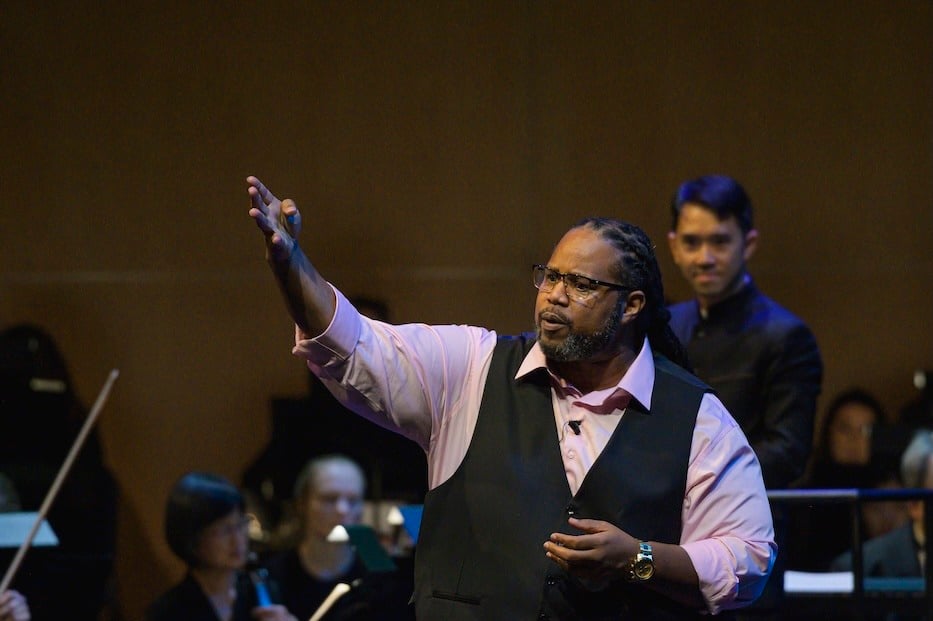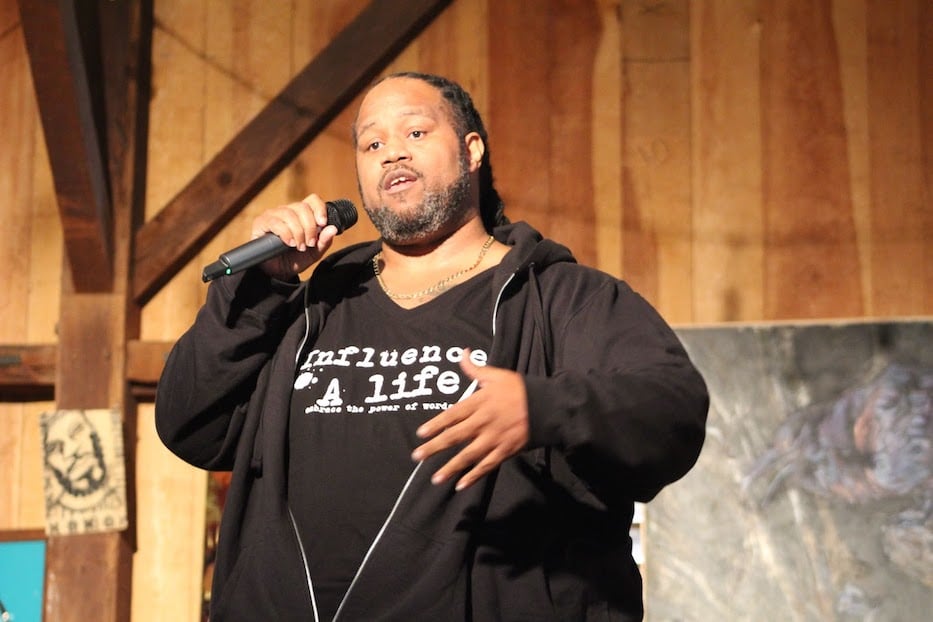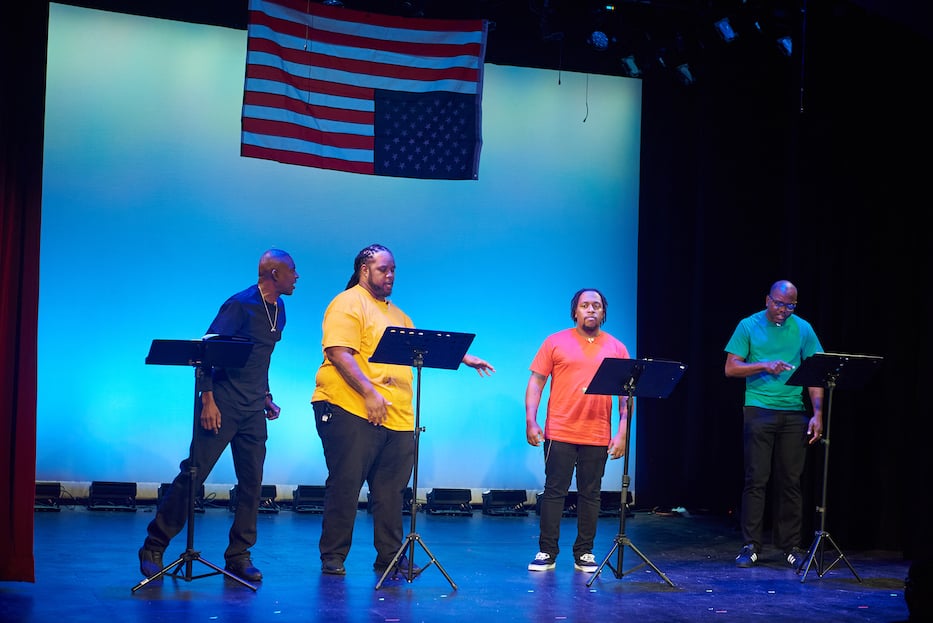
Culture & Community | International Festival of Arts & Ideas | Poetry & Spoken Word | Arts & Culture | New Haven Symphony Orchestra | Elicker Administration | Arts & Anti-racism

Sharmont "Influence" Little used to hide the fact that he was a poet, because it seemed like something Black boys in the projects didn't do. Now, his secret is out in the open—and New Haven is better for it.
Little, who is 48, stepped into the role of the city’s inaugural poet laureate on Jan. 1. In the first year of his tenure, he has used spoken word to build bridges between City Hall and the wider community, with focus on storytelling that does not flinch or flee, but speaks truth to power.
"It's been a blessing in all forms," he told the Arts Paper about his year as poet laureate. He credited Kulturally LIT Founder IfeMichelle Gardin with the vision to see what the position could be. "It afforded me the ability to be inside rooms that I never would have been in."
Little's term as poet laureate runs through Dec. 31, 2025. This year alone, his creative footprint has leapt from City Hall to the Lyman Center Stage, from Bridgeport to the Beinecke, from a barn filled with Black art to Black Wall Street on the New Haven Green.
He's taken Beethoven to task, honored Black activists and trailblazers, and made time for mentorship and healing work throughout all of it.
And if his flurry of public poetry work in 2024 is any indication, he is just getting started.
Setting The Stage
On a recent Sunday afternoon at the John Lyman Center for the Performing Arts, Little took the stage with a full symphony behind him. Somewhere in the percussion section, Brian Jawara Gray played him in, his drum a steady heartbeat. The bellow of brass and breathing of woodwinds had just introduced The Creatures of Prometheus, Beethoven’s rarely-performed 1801 ballet.
Then instruments pulled back, and it was just Little and the drum. Music Director Perry So stood behind him, still at the podium. For a moment, even a rogue breath seemed like it was audible.
“Imagine if humanity could turn war into a party,” Little read from memory, his hands lifted as if to point to that party somewhere on the stage. “A barbecue / a cookout / a pool party, where / bombs are balloons / where / missiles are streamers / where / bomb-sniffing dogs are actually the petting zoo / and drones, drones spell out happy messages in the clear blue sky.”
The room crackled, electric; the audience rapt. He pressed on.
“You see I shouldn’t need a candle to wish / That when I heard about a party / When I heard about a party / It had nothing to do with searching for bodies they had left.”
The Journey

Little in 2022, at a rehearsal for Steve Driffin's Death By 1,000 Cuts: A Requiem for Black and Brown Men. Lucy Gellman File Photo.
Long before he was New Haven's poet laureate, Little was just a kid growing up in the old Farnam Courts, which he and his peers called the Franklin Street Projects. As a young person, Little had no inkling of the role poetry would play in his life, although there were flickers of it along the way. One of them came in third grade, when a teacher at Nathan Hale School nurtured an early interest in writing.
He still remembers her—a certain Ms. Vernon—with a warm fondness in his voice. But back at Farnam Courts, he didn't feel like he could share his talent publicly. It was only decades later, as he picked up his pen and also embraced acting, that he began to unpeel the expectations around masculinity.
"I put it away, cause it wasn't cool for someone to write poetry in the late 80s, early 90s," he said. "It wasn't cool. Right? Your homeboys would consider you to be soft or whatever at that time. So I put it away, and I only did it when I was in the house at night."
A few years later, poetry found him again. During the week, Little's dad was loving but strict. "It was all about school and reading," Little recalled. His nose was often buried in a book, or learning about Black history and culture. Because his dad was also a Mason, Little often got it straight from the source.
"I was in the house reading dictionaries!" he remembered with a laugh at the edge of his voice. "He made sure I knew my history."
When Little's older brother went off to college in the 1990s, Little discovered his journal of poems, all of them kept private. It felt like a sign from the universe to start writing more openly. As he did, the words poured out of him: about fatherhood, about toxic masculinity, about violence; about the continued oppression of Black men and Black people; about the history of the city that had raised him, and where he chose to stay.
"New Haven has always been my inspiration," he said. "The struggle of my people here in New Haven, the struggle of young people, education, New Haven has always been the inspiration behind it."
Poetry Meets Practicality

Little performing at the 2023 Amplify the Arts Festival in Hamden. Abiba Biao Photo.
Even as he deepened his passion for poetry and spoken word, Little navigated his way through multiple careers, a strategy that allowed him to take spoken word gigs for free or very little money (for the record, neither he nor this reporter are advocating for paying poets in exposure—but that's just the way the scene was, he said).
"I don't believe in being a starving artist," he said. For years, he tried to find the right career. He considered becoming a corrections officer, but failed the physical exam for reasons he still attributes to bias. He soared through exams for the New Haven Fire Department, but it was 2003—the same year as Ricci v. DeStefano—and suddenly the department didn't seem like a particularly welcoming place to work He earned an EMT license, which became his gateway to the healing profession.
It was then, just as poetry had been a revelation, that he discovered nursing. When Little headed to nursing school, it was to give him a stable career—doubly important as he met his wife, Keosha Little, and became a father to his daughters Sharniya, who is now 24, and Samarria, who is 20. He found that his writing and his nursing soon lived side-by-side, one informing the other as he worked.
"Nursing was the failsafe for me to be able to do my poetry," he said. But the two never really remained separate, from the poems that would come to him during and after work to the people he met on the job. To this day, one of his most moving pieces remains "Black Boy," which begins with a patient questioning his motivations to become a nurse. The patient in question is also Black, but he's still just a kid, and in the hospital from a gunshot wound.
"As a nurse, I see more Black boys die in hospital beds than I care to count," Little reads early in the poem, and a listener—no matter if they've heard the poem one time or 100—can't look away. "Have heard more mothers scream God help me! with the white voice in the room saying I did all I could."
In the sweeping evisceration of gun violence that follows (Listen to an earlier performance of the work at last year’s Kulturally LIT Fest here), Little's lyricism is matched only by his sense that something is deeply wrong with this country.
"Call it, Black-on-Black civil war," he roared in a performance of the poem at the Dixwell Community Q House last fall. "Call it ethnic suicide / But Black boy, you ain't no soldier / I've seen how you die."
That sense of profound feeling in each of his poems is and has long been a constant in Little's work. Alongside his nursing career—Little is now a home health nurse—he blossomed as a slam poet, writer, and teaching artist, with gigs for both Arts for Learning Connecticut and his own Influence A Life LLC.
Alongside artists like Yex Diaz, Tarishi "Midnight" Shuler, Warren Hawk and Croilot, he competed for multiple years in the National Poetry Slam, representing Connecticut as part of the Verbal Slap slam poetry team. He began curating the "Poetz Realm," an open mic night at BPT Creates in downtown Bridgeport. It's often a night of sizzling poetry, from slam preliminaries to poets who bring sharp, propulsive storytelling to the mic.
And somehow, he also found time for mentorship and for the stage. In early 2022, Little played "Gold" in the world premiere of Death By 1,000 Cuts: A Requiem for Black and Brown Men, a lyrical tour de force by New Haven playwright Steve Driffin. In the years since, the play has gone on to performances at Long Wharf Theatre and New York City. Multiple times, Driffin, who is also the director of programs at ConnCAT, has praised Little for helping him bring the work to life.
Just like his mentorship, Little said, his hope in theater is to leave an impact on those who have a chance to witness his work—including and especially young people who may see themselves in him.
"I provide young people with an art form that they can utilize and everyone listens when you stand up and speak poetry," he said. "You have the entire room's attention at that time. So, I also teach them it's a responsibility for you to be honest with yourself, what you're feeling, and what's going on for you to tell your absolute truth about what's happening."
The Making Of A Poet Laureate
.jpeg?width=904&height=603&name=IMG_3307%20(1).jpeg)
Little was inducted as New Haven's first poet laureate during a ceremony at City Hall. Markeshia Ricks Photo.
As Little was growing his artistic reach, so was Gardin, with a vision for the literary arts in New Haven that spanned all of its 18.7 square miles. As Kulturally LIT (formerly Elm City LIT Fest) evolved from a neighborhood book club to a day-long celebration of Black books and Black people, she started thinking about the fact that New Haven didn't have a poet laureate.
By the time 2023 rolled around, she could sense the need to do something—particularly watching other city poet laureates perform. She recalled attending the annual "Z Experience Poetry Slam" at the Yale Peabody Museum last January, and thinking that enough was enough.
"They had the Enfield Poet Laureate, Nzima [Hutchings], they had [Hartford Poet Laureate Emeritus] Frederick-Douglass Knowles, and Josh [Brown] from New London, and someone from Portland, Connecticut," she remembered in a phone call Friday morning. "And I was like, Portland has a poet laureate? And we don't? And New Haven is the cultural capital of Connecticut? How does that sound?"
Gardin started researching what it took to appoint a poet laureate in Connecticut (it turns out that the process is fairly straightforward, she said). She called Adriane Jefferson, director of cultural affairs at the city. The two put out a call, with the intention of naming a poet who could begin their term in 2024. Then, while she ran LIT Fest at the Dixwell Community Q House last year, a panel of judges winnowed down a series of entries to the finalists, and calculated the results. Little—whose work Gardin had followed for years—eeked out a victory.
"There are so many talented poets that deserve a lot of recognition and work hard in their craft," Gardin said. "For the inaugural person to be Sharmont ... I was really glad. I love what his vision for the position is. He really set a precedent for the position with programming, with activating City Hall."
And he has, from the moment he stepped into the position. At the top of this year, Little transformed City Hall with an afternoon of poetry and inaugural "Elm City Flow," an open mic that has since become a monthly trademark of his tenure. From that performance, he has gone on to honor Hill Parents Association founder Fred Harris, grace the International Festival of Arts & Ideas and Black Wall Street, and help the New Haven Symphony Orchestra (NHSO) reimagine Beethoven's The Creatures of Prometheus with poetry and dance.
Maestro Perry So, music director at the NHSO, remembered being "entirely speechless" the first time he heard Little perform. He later approached him with the idea for multimedia collaboration, which the NHSO has said it hopes to do more of going forward.
"There was something that ... timeliness doesn't even go to the heart of it" he said of hearing Little's work for the performance. "Sharmont's woven into his understanding and his presentation something that is so fundamental to the way that we think about being humans. It's both universal and incredibly, incredibly personal at the same time."
"Look Out For Us"

Gold (Sharmont "Influence" Little) with Black (Rodney T. Moore, at left), Red (Stephen King) and Green (Jason Phenix Hall) and . Photo courtesy of the West Side YMCA and M.A.D. Content.
In a phone call last Saturday, Little was quick to say—as he often does—that he does not do any of this work alone. In addition to organizations like the NHSO and Arts & Ideas, he holds in his heart a special place for LIT Fest, without which his position would not exist. He noted the need to both thank and honor culture-bearers like Gardin, who have championed Black art and artists in New Haven for decades.
"This year has been a huge boon to Black art in New Haven, and a lot of that is Kulturally LIT and Ms. Ife," he said. "I want to tell the community to look out for us and support us, to continue to support Black artists."
He added that he—like many artists this and last year—believes New Haven is now in a special moment of cultural flourishing, particularly for artists who have long been pushed to the cultural margins. He nodded to the growth of events like Black Wall Street and LIT Fest, which this year celebrated James Baldwin's centenary with monthly book clubs, film screenings, live theater and music.
And, of course, his own performances.
Before closing out the symphony’s recent performance of Prometheus at the Lyman Center last month, Little appeared onstage with his wife Keosha, performing a duet-meets-love-poem that highlighted the miracle of being alive and getting to share it with another human. As the two looked into each other’s eyes, swaying, drum and violin began to move in time with each other, until it seemed the whole theater was breathing in time with the sound. Her voice rose and fell, then stopped.
“Baby, you should never need to ask how deep my love is for you,” he began, and the whole room waited to see what he would do next. “No matter how much of a prolific poet I become / My words could never describe how much my soul would give to you.”
Abiba Biao contributed reporting.

